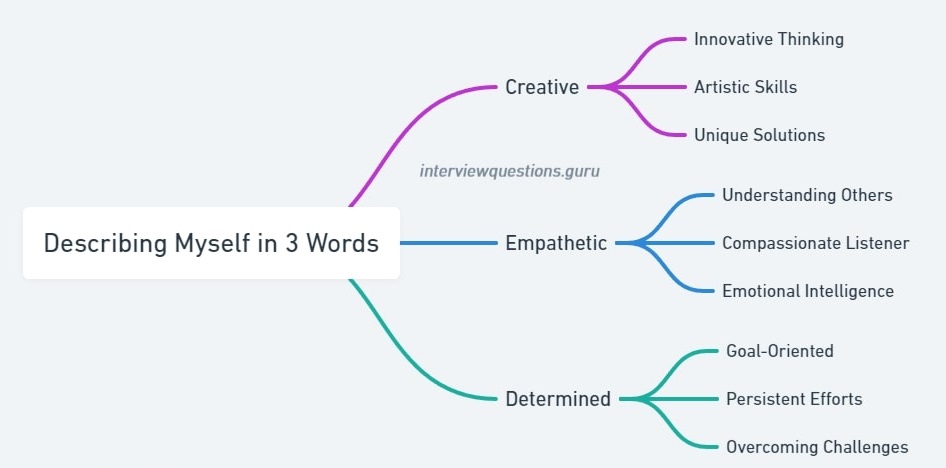Describe Yourself in 3 Words! Interview Question” is a classic test of your self-awareness and ability to communicate your brand concisely. In this article, we’ll share some strategies to craft the perfect response.
The interview process often begins with questions about oneself. The ability to describe yourself effectively sets the tone for the entire interview. It’s not just about the words you choose. It’s about the story they tell and the impression they leave.
Table of Contents
Understanding the ‘Describe Yourself in 3 Words’ Question
- What Interviewers are Asking: This question is less about the specific words and more about what they reveal regarding your self-awareness, confidence, and suitability for the role. It’s a window into your personality and work ethic.
- The Psychology Behind the Question: Interviewers use this question to gauge how well you understand the role and align with the company’s values. It’s also a test of your ability to communicate succinctly and effectively.
Choosing the Right Words
- Self-Assessment Techniques: Before the interview, reflect on your strengths, weaknesses, and career achievements. Consider feedback from colleagues and mentors to get a well-rounded view of yourself.
- Words that Resonate with Employers: Choose relevant words to the role you’re applying for. If it’s a leadership position, words like “Creative,” “Empathetic,” or “Determined” might be appropriate. For a team-oriented role, consider “collaborative,” “supportive,” or “adaptable.”
Word 1: Leadership Qualities
Examples of Leadership in Action: Share specific instances where your leadership made a tangible impact. This could include leading a project, mentoring team members, or making tough decisions.
How to Showcase Leadership in Interviews: Use stories and examples highlighting your leadership style and how it has evolved over your career.
Word 2: Team Player
Collaborative Efforts and Successes: Illustrate your ability to work well with others, showing how you contribute to a team’s success while also valuing the contributions of others.
Balancing Individuality and Teamwork: Explain how you maintain your individuality and ideas while being integral to a team.
Word 3: Innovative Thinker
Demonstrating Creativity in Problem-Solving: Share examples of how your innovative thinking has led to successful solutions in past roles.
Innovative Solutions in Past Roles: Discuss times when your out-of-the-box thinking was crucial in overcoming challenges.
Other Resources
List of Common Interview Questions and Answers
How to Answer How Would You Characterize Yourself? 8 Examples
7 Example Answers to Describe your Personality? Interview Question
Alternative Word 1: Reliable
Consistency and Dependability in Work: Highlight your track record of reliability and how it has benefited your previous employers.
Reliability in Challenging Situations: Share instances where your reliability was tested and how you proved dependable.
Alternative Word 2: Adaptable
Adjusting to Change and Challenges: Discuss times when you successfully adapted to new environments or unexpected changes.
Flexibility in Work Environments: Explain your approach to adapting to different team dynamics and work cultures.
Alternative Word 3: Detail-Oriented
Precision and Attention to Detail: Illustrate how your attention to detail has led to high-quality work and error reduction.
Achieving Excellence Through Details: Share examples of projects or tasks where your meticulous approach made a significant difference.
List of 100 words to answer Describe Yourself in 3 Words
- Adventure
- Brilliant
- Creative
- Dazzling
- Enthusiastic
- Fantastic
- Graceful
- Harmonious
- Inspirational
- Joyful
- Kindhearted
- Luminous
- Magnificent
- Nurturing
- Optimistic
- Passionate
- Quirky
- Resilient
- Serene
- Thoughtful
- Unique
- Vibrant
- Wise
- Youthful
- Zealous
- Ambitious
- Blissful
- Compassionate
- Dynamic
- Empathetic
- Fearless
- Generous
- Humble
- Imaginative
- Jovial
- Knowledgeable
- Loyal
- Mindful
- Nostalgic
- Observant
- Playful
- Quick-witted
- Reliable
- Spirited
- Tranquil
- Understanding
- Vivacious
- Warm-hearted
- Youthful
- Zestful
- Artistic
- Bold
- Charismatic
- Determined
- Elegant
- Friendly
- Genuine
- Honest
- Intuitive
- Joyous
- Keen
- Loving
- Meticulous
- Noble
- Open-minded
- Persistent
- Quaint
- Reflective
- Sophisticated
- Tenacious
- Uplifting
- Versatile
- Witty
- X-factor (unique quality)
- Yearning
- Zeal
- Affectionate
- Brave
- Curious
- Devoted
- Energetic
- Forgiving
- Hopeful
- Independent
- Jubilant
- Kind
- Learned
- Merciful
- Nifty
- Optimistic
- Pragmatic
- Quintessential
- Respected
- Stable
- Tactful
- Unwavering
- Valiant
- Whimsical
- Xenial (hospitable)
- Young-at-heart
Mistakes to Avoid When Describing Yourself
- Overused Terms and Clichés: Avoid generic terms like “hardworking” or “team player” unless you can back them up with unique examples.
- Balancing Confidence and Humility: It’s crucial to strike a balance between showcasing your strengths and not coming off as arrogant.
Tailoring Your Words to the Job Description
- Aligning Your Words with Company Values: Research the company’s culture and values and choose words that reflect those.
- Researching the Role and Company Culture: Understanding the company’s ethos can help you tailor your response to resonate with the interviewer.
How to Convey Your Words in the Interview
- Effective Communication Strategies: Practice delivering your response confidently and concisely.
- Body Language and Tone of Voice: Non-verbal cues are just as important. Maintain eye contact and a confident posture.
Supporting Your Words with Examples
Using the STAR Method in Responses: Structure your examples using the Situation, Task, Action, Result (STAR) format for clarity and impact.
10 Star Method Interview Questions
Relevant Stories and Experiences: Draw from a diverse range of experiences that showcase your chosen words in action.
Conclusion: The Power of Three Words
In conclusion, the “Describe Yourself in 3 Words! Interview Question” is more than just a query; it’s an opportunity to showcase your self-awareness, relevance to the role, and your ability to communicate effectively. You can leave a lasting impression on your interviewer by carefully selecting your words and backing them up with concrete examples. Remember, these three words are a window into your professional persona, so choose them wisely.
